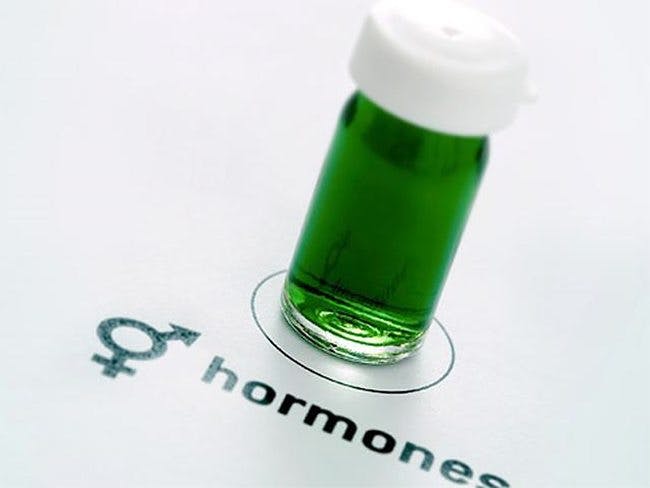Get your hormones checked and lose weight
Before we get started, here’s a short recap of the tips so far: The first and most crucial piece of advice was to choose a low-carb diet. The next were eating when hungry, eating real food, measuring progress wisely, thinking long-term, limiting fruit, alcohol and artificial sweeteners, reviewing your medications, stressing less and sleeping more, eating less dairy and nut products, stocking up on vitamins and minerals, exercising and finally, getting into ketosis.
This is number fifteen:
15. Get Your Hormones Checked

So you’ve followed the previous tips, implemented major lifestyle changes and established that neither medication nor vitamin deficiency is an issue. You’ve even tried raising your ketone levels for a while (ensuring low insulin levels). And you still can’t hit the normal weight mark?
If this applies to you, it’s high time to consider the possibility that hormonal imbalances are the cause of your troubles. There are three common problem areas:
- Thyroid hormone
- Sex hormones
- Stress hormones
Thyroid hormone
Some people, especially women, suffer decreased metabolism as a result of thyroid hormone deficiency – hypothyroidism. Common symptoms are:
- Fatigue
- Cold intolerance
- Constipation
- Dry skin
- Weight gain
In these cases, weight gain resulting from decreased metabolism usually does not exceed fifteen pounds.
Your doctor can easily arrange for you to take a blood test to measure the concentration of thyroid stimulating hormone (TSH). If the test comes back and everything looks good, your thyroid gland is probably fine. For a more exact diagnosis, you can ask them to measure the actual levels of thyroid hormone in the blood (T3 and T4).
Two ways to avoid becoming deficient in thyroid hormone:
- Make sure you consume enough iodine, which is a building block of thyroid hormone. Good sources are fish, shellfish and iodised salt (or sea salt).
- Very low levels of thyroid hormone can indicate an autoimmune reaction to the thyroid gland itself. This means you’ll have to take thyroid hormone supplements orally, usually the stable form T4 (Levaxin), which your doctor can prescribe for you. Your body will transform this into the active T3 hormone when necessary. The supplement dose should be adjusted so that you reach normal hormone levels (TSH, T3, T4) and sufficiently alleviate symptoms – though a few people feel best when keeping TSH slightly below normal.
Some people feel better supplementing the already active T3 (sometimes prepared from pig thyroid glands), as it can give a stronger effect than the T4 hormone, but its effect is often harder to control. Swedish healthcare rarely prescribes or offers such T3 treatment, as it often lacks advantages and may pose a risk when doses are high for an extended period of time.
“Hypothyroidism Type 2”
Some alternative health coaches will diagnose you with the condition “hypothyroidism type 2” if you’re experiencing symptoms of fatigue etc., despite normal blood levels of thyroid hormones, and will recommend supplementation anyway. Be skeptical of this. You’ll likely end up trying to mask other health issues (i.e. the real causes of your symptoms) by slathering your system with overdoses of thyroid hormone.
Of course, some people will certainly feel more lively and alert (at least in the short term) running on an overdose of thyroid hormone. On the other hand, many people feel more lively and energetic when using amphetamine, too. That doesn’t mean their fatigue was caused by a lack of amphetamine!
Sex hormones
Sex hormones also affect your weight:
Women: Women can suffer from the endocrine disorder PCOS – polycystic ovarian syndrome – which elevates testosterone and insulin levels. This can mean weight gain and menstrual disorders (very common), infertility, acne and male pattern hair growth (such as facial hair). A low-carbohydrate diet is a good treatment for this. More on PCOS.
During menopause, a woman’s level of the female sex hormone estrogen drops. This often causes some weight gain, especially around the gut (so-called central obesity). Any excess weight gained after menopause will tend to be less femininely proportioned, less curvy.
Men: From middle age and onwards, men experience gradually declining levels of the male sex hormone testosterone. This leads to slight weight gain, also typically around the gut, and decreased muscle mass.
What can you do about sex hormones?
Testosterone deficiency can be at least partially treated naturally by engaging in smart exercise routines and supplementing vitamin D.
Of course, you can also affect testosterone levels by getting your doctor to prescribe a testosterone supplement (a blood test will confirm any deficiency). Women can use estrogen supplementation for climacteric problems.
It’s important you take into account, however, that supplementation of testosterone or estrogen for years on end, in doses that are abnormally large for your age, may increase the risk of prostate cancer (in men) and breast cancer (in women).
A better option might be to try and focus on a healthy lifestyle instead, and to be as happy and grateful as you can for the body you have.
Stress hormone
The final possible culprit behind stubborn weight issues may be the stress hormone, cortisol. Too much cortisol can increase hunger levels, bringing along subsequent weight gain. The most common cause of elevated cortisol is chronic stress and lack of sleep (see tip #10), or cortisone medication (tip #9). It’s a good idea to try your utmost to do something about this.
In rare and extreme cases, you could be dealing with a specific kind of tumour that drives cortisol production. The condition is called Cushing’s syndrome. If you suspect you’re suffering from this, consult your doctor and they will run the appropriate tests.
More
All 15 tips: How to Lose Weight